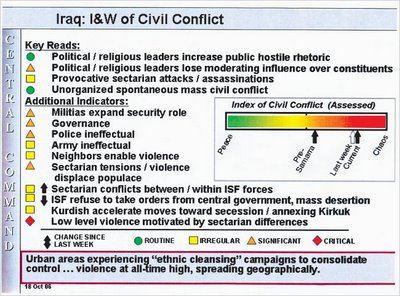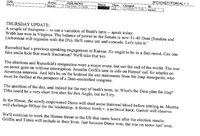Updated below on 11/6/06
The
New York Times published this graphic (above) showing our military's assessment of the truth on the ground in Iraq--an inexorable slide toward chaos.
Now, some of the blowhards who only weeks and months ago were deeming Iraq War critics unserious, cowardly, terrorist-loving, cut-and-run, latter-day-Chamberlains, are finally engaging with some of the realities of the Iraq they helped wrought.
Of course,
as Glenn points out, few are acknowledging the irony of their sudden shift, or apologizing for their prior demonization of their political opponents--opponents who were politically, culturally and historically astute enough to foresee where we are today and wisely counsel against the course that brought us here. I doubt there will be many
mea culpas issued from the Right to the likes of Howard Dean, Russ Feingold or Jim Webb.
The so-called "experts" predicting cakewalks, sweets, flowers, massive caches of WMDs, minimum casualties and an entirely Iraqi oil-financed war, rather than being hounded from public life for their egregious errors of judgment, rather than being ignored in all future public debate about important matters of state, simply change position and divorce themselves from their prior views.
Being right is irrelevant if you can just ignore that you were ever wrong. But at least you can say that this group (eventually) acknowledged what many of us have known for quite some time.
Other of the blowhards, however,
continue apace in their personal realities, whistling past the Iraqi graveyards, calling the New York Times traitors for publishing the unfortunate truth (see above) about the situation in Iraq. After all, it's much easier to lie about what the military's opinion is of Iraq when you prohibit the public from knowing.
Meanwhile, President Bush
laments the "tone" in Washington, within a day of saying his opponents want the terrorists to win.
As the Times puts it in one of its stronger editorials, "Since he can’t defend the real world created by his policies and his decisions, Mr. Bush is inventing a fantasy world in which to campaign on phony issues against fake enemies."
In other news, in the hopes of distracting attention from one of the most monumental failures of foreign policy and executive decisionmaking in the nation's history,
Bush is now angling to flaunt the upcoming death sentencing for Saddam Hussein--postponed until November 5,
two days before the congressional elections.
Here's the take from
Think Progress:
Asked today whether the verdict would be a factor in the U.S. elections, White House Press Secretary Tony Snow said, “You are absolutely right, it will be a factor.” Snow said the verdict “may fit into a larger narrative about an Iraqi government that has been doing what the president has said all along.” He portrayed the decision as yet another turning point for Iraq. “This is a benchmark episode, where the Iraqi people are taking control of their own destiny,” he said.
. . .
The day Hussein was captured, President Bush addressed the nation. He said the capture “marks the end his of the road…for all who bullied and killed in his name.” For ordinary Iraqis, it was “further assurance that the torture chambers and the secret police are gone forever.” Bush said, “A hopeful day has arrived. All Iraqis can now come together and reject violence and build a new Iraq.”
In the three years since, all of these claims have come undone. Since Hussein was captured:
– 2,358 U.S. soldiers have died, roughly 85 percent of the total U.S. fatalities during the Iraq war.
– Iraq has “become the cause celebre for jihadists, breeding a deep resentment of US involvement in the Muslim world and cultivating supporters for the global jihadist movement.” [Link]
– Torture in Iraq “may be worse now than it was under Saddam Hussein, with militias, terrorist groups and government forces disregarding rules on the humane treatment of prisoners,” the U.N.’s anti-torture chief said in September. [Link]
– Prospects for the “new Iraq” have fallen sharply. The 10-member bipartisan commission that is charged with assessing Bush’s Iraq strategy has reportedly “ruled out the prospect for victory.” [Link]
Finally, it seems that the so-called "
Army of Davids" (read: bloggers with lots of spare time and a passionate unwillingness to understand they were wrong about the WMDs) enlisted by the government to find a post-hoc rationalization for the war, has been happily
disseminating nuclear secrets--written in Arabic--across the world. After a year, the government has finally pulled the plug on this REAL breach of national security.
The election is in four days.
Update:
So the office in charge of routing out corruption in Iraq has been given the axe. The recent military appropriations bill contained language inserted by Republicans terminating the Office of the Special Inspector General for Iraq Reconstruction, "over the objections of Democratic counterparts during a closed-door conference, and it has generated surprise and some outrage among lawmakers who say they had no idea it was in the final legislation."
It's harder to be corrupt when somebody is looking for it. And what's a few hundred billion dollars between friends?
Vanity Fair has an interesting article on the neoconservatives rushing to blame others for
their war in Iraq. Remember what Colin Powell said, guys:
"You break it, you bought it."As Kevin Drum and
Digby point out, "this pathetic attmpt by the neocons to separate themselves from the architects of the war should be drowned in the bathtub."
It's worth saying very plainly what's going on here: the neocons are using these interviews to make the case that neoconservatism is in no way to blame for the disaster in Iraq. If they had been in charge things would have been different.
This baby needs to be strangled in its crib. The 1997 "Statement of Principles" of the Project for a New American Century, the neocon Bible, was signed by, among others, Dick Cheney, Donald Rumsfeld, Paul Wolfowitz, Zalmay Khalilzad, Scooter Libby, and Elliot Abrams. All of these men were deeply involved in the formulation, planning, and execution of the Iraq war. The neocon creed was part and parcel of every move they made.
. . .
The failure of Iraq is inherent in the naive idealism and fixated ideology of neoconservatism, and shame on us if we let them get away with suggesting otherwise. This is one rehabilitation project that needs to be stopped dead in its tracks.
Before we get too carried away, Tristero discusses the limits of schadenfreude
here.
That being said, neoconservative Michael Ledeen is
caught lying about whether he was
actually against the Iraq War all along. Nope.
Here he is in the
National Review before the war started, mocking Brent Scowcroft for wisely advising against the war:
It's always reassuring to hear Brent Scowcroft attack one's cherished convictions; it makes one cherish them all the more. . . .
So it's good news when Scowcroft comes out against the desperately-needed and long overdue war against Saddam Hussein and the rest of the terror masters. As usual, Scowcroft has it backwards: He's still pushing Saudi Arabia's Prince Abdullah's line that you've just got to deal with the Palestinian question. Blessedly, President Bush knows by now that the Palestinian question can only be addressed effectively once the war against Saddam and his ilk has been won. And then Scowcroft says "Saddam is a problem, but he's not a problem because of terrorism."
This is the head of the President's Foreign Intelligence Advisory Commission? Doesn't he read the newspapers? He doesn't seem to realize that Saddam is actively supporting al Qaeda, and Abu Nidal, and Hezbollah.
However, nobody is perfect, and Scowcroft has managed to get one thing half right, even though he misdescribes it. He fears that if we attack Iraq "I think we could have an explosion in the Middle East. It could turn the whole region into a caldron and destroy the War on Terror."
One can only hope that we turn the region into a cauldron, and faster, please. If ever there were a region that richly deserved being cauldronized, it is the Middle East today. If we wage the war effectively, we will bring down the terror regimes in Iraq, Iran, and Syria, and either bring down the Saudi monarchy or force it to abandon its global assembly line to indoctrinate young terrorists.
His "cauldron" has now led to
hundreds of thousands of dead Iraqis, thousands of dead and wounded American servicemen, an inflamed Middle East angry at our country, and a world that no longer trusts us. And yet he is so lacking in shame that
he says this:
I do not feel "remorseful," since I had and have no involvement with our Iraq policy. I opposed the military invasion of Iraq before it took place and I advocated—as I still do—support for political revolution in Iran as the logical and necessary first step in the war against the terror masters.
Swing and a miss. It would be funny if thousands weren't dead because these jokers thought that warfare was a game of
Risk, or a marketing strategy for electoral success.
Remember this? (from CNN before the war):
Why did the Administration wait until September to make its case against Iraq? White House chief of staff Andrew Card told The New York Times last week, "From a marketing point of view, you don't introduce new products in August."
. . .
To those who say, we want more evidence that there's a real threat, the Administration says, we can't wait for a smoking gun to turn up. "We don't want the smoking gun to be a mushroom cloud," National Security Advisor Condoleeza Rice said on CNN's Late Edition recently.
To those who smell politics, the administration's answer is, sure, a crisis may benefit the president politically. So what? An issue of this magnitude should be the focus of a political campaign. What's wrong with that?
These are the people that want your trust in the voting booths tomorrow.
Finally, looking around the internets, I see that
Iraqi blogger Riverbend is not exactly heartened by the curiously-timed news of Saddam's impending execution.








